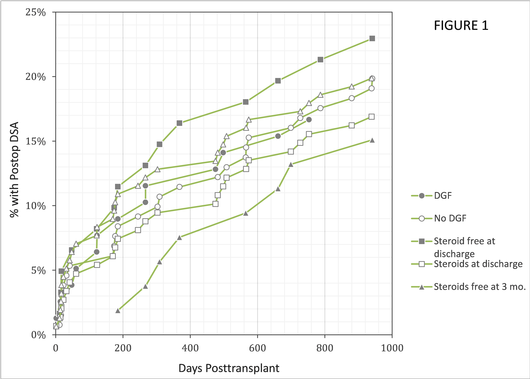Late De Novo Donor Specific Antibodies in Steroid Free Immunosuppression and Delayed Graft Function
Temple University School of Medicine, Philadelphia, PA
Meeting: 2020 American Transplant Congress
Abstract number: B-113
Keywords: Alloantibodies, Immunosuppression, Rejection
Session Information
Session Name: Poster Session B: Kidney Immunosuppression: Novel Regimens and Drug Minimization
Session Type: Poster Session
Date: Saturday, May 30, 2020
Session Time: 3:15pm-4:00pm
 Presentation Time: 3:30pm-4:00pm
Presentation Time: 3:30pm-4:00pm
Location: Virtual
*Purpose: Donor Specific Antibodies (DSA) have been implicated in acute and chronic antibody-mediated rejection. Once developed, they tend to be persistent and lead to transplant glomerulopathy, allograft dysfunction and graft loss. Delayed graft function (DGF) and steroid minimization have been implicated in de novo DSA production. Attempts to prevent or slow DSA progression are challenging and risk over-immunosuppression. We study the effects of DGF and steroid minimization on de novo DSA development.
*Methods: A retrospective cohort study of renal transplantation patients from a university hospital from 2013 through 2019 was performed. The analysis of de novo DSA development and postop time frame excluded patients with a history of re-transplantation and multi-organ transplantation. Variable comparisons were made with regards to whether patients had DGF, whether they were discharged with or without steroids, and whether they were maintained steroid-free at 3-month follow-up or remained on steroids.
*Results: A total of 209 kidney allograft recipients were identified. There were 13 (16.6%) DSA positive of the 78 patients with DGF compared to 28 (21.4%) of the 131 patients that did not have DGF (RR=0.78, 95% CI=0.43-1.41). Average time for first positive titer was 267 (±252) days for DGF patients and 446 (±400) days for those who did not have DGF (p=0.09). There were 15 (24.6%) DSA positive of the 61 patients discharged steroid-free compared to 26 (17.6%) of the 148 patients discharged with steroids (RR=0.1.40, 95% CI=0.80-2.45). Average time for first positive titer was 392 (±406) days for those discharged steroid-free and 388 (±350) days for those not (p=0.98). There were 9 (17.0%) DSA positive of the 53 steroid-free patients at 3-month follow-up compared to 32 (20.5%) of the 156 patients remaining on steroids (RR=0.85, 95% CI=0.43-1.69). Average time for first positive titer was 600 (±387) days for those steroid-free at the 3-months and 331 (±344) days for those not (p=0.08). Figure 1 illustrates the percentile progression of DSA positive patients with time for each comparison grouping.
*Conclusions: Our data suggests that DGF is not a predisposing factor for DSA development. Contrary to the notion that a reduction in steroids following renal transplantation may lead to earlier DSA development and rejection, our data suggests that there is no significant increase in risk. Development of a maintenance protocol with an earlier reduction in immunosuppression may be appropriate with continued monitoring for preserving kidney transplant function and improving long-term graft survival.
To cite this abstract in AMA style:
Karhadkar S, Falz M, Diamond A, Carlo ADi, Timofeeva O. Late De Novo Donor Specific Antibodies in Steroid Free Immunosuppression and Delayed Graft Function [abstract]. Am J Transplant. 2020; 20 (suppl 3). https://atcmeetingabstracts.com/abstract/late-de-novo-donor-specific-antibodies-in-steroid-free-immunosuppression-and-delayed-graft-function/. Accessed January 22, 2026.« Back to 2020 American Transplant Congress

